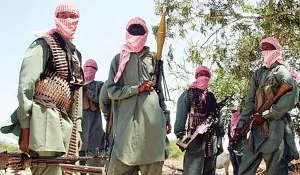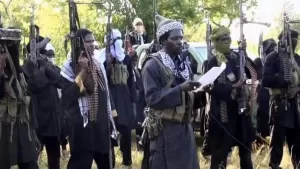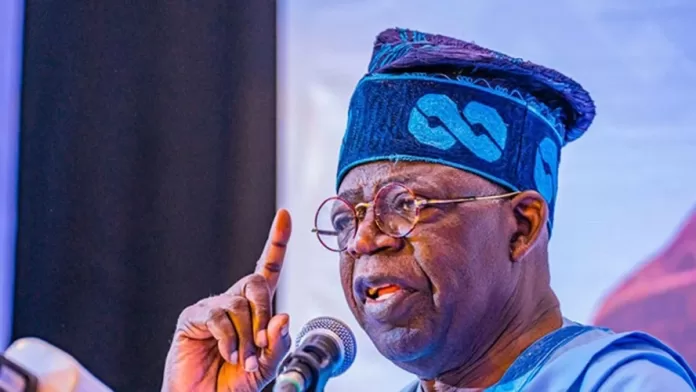President Bola Tinubu has warned terrorists and bandits tormenting Nigerians to surrender to the government forces or get killed.
Tinubu issued the warning at the 1st News Agency of Nigeria (NAN) annual international lecture held in Abuja with the theme: “Insecurity in the Sahel (2008-2024): Dissecting Nigeria’s challenges — Genesis, Impacts and Options.”
The president, who represented by the national security adviser, Mallam Nuhu Ribadu, said his administration had implemented kinetic and non-kinetic strategies to eliminate threats across the country in the last year.
He said the administration had also adopted a multifaceted approach to tackling the security challenges, as enshrined in the Renewed Hope Agenda, which prioritised security as a critical component of government focus.
“The administrations in the last year had put in place processes, policies and programmes to achieve improved security, economic development, and welfare for all Nigerians,” the president said.
Tinubu further stated that the administration had developed both kinetic and non-kinetic strategies towards considerably eliminating the threats of Boko Haram.
“Cowards, idiots, banditry, kidnapping for ransom and violent extremists. Bad people. I can assure you that people are here to confront you.
“Enough is enough. For 15 years, we’ve been going through hell in this country. Bad people are doing what they like. They continue to interfere with where we live, our lives, our commerce, our education, our health system, our transportation, and so on. And we sit down and stand and allow them? Enough is enough. It has to stop. It will stop.”
President Tinubu sent a strong warning to those involved in kidnapping for ransom, which he said had declined.
“It’s a warning to them. Short time remains. If you want to live, leave it this way. If you want to live your life, stop it. Examples have been sent. They have seen what is happening to their leaders.
“Now, non-kinetic energy is still important. Windows are open; doors are open. Suppose you are ready to come and surrender and stop it. Otherwise, you know what will happen to you, whoever you are.”
The president said that many people in the north are returning home following the restoration of peace in their communities, which would boost food production.
He remarked that kidnapping had replaced old crimes such as robbery and burglary.
“We have defeated armed robbery before in our country. We will also defeat kidnappers. It’s a matter of time. We are just only one year, three months or four months old. Give us time. Give us time. We have also taken steps to improve governance by strengthening institutions, promoting accountability and ensuring inclusive decision-making. Even those who corrupt people, be careful. It will come to you. It’s coming,” he warned.
According to the president, insecurity in the Sahel is complex, with deep roots in sundry causal factors such as climate change, food insecurity and extremism, which have created a ring of violence and instability.
“A secured Nigeria is a secure Sahel region because of our number, size, and strategic position where we are. We are fixing Nigeria and, you see, it will translate into good things for our neighbours who are indeed facing challenges and difficulties,” he said.
Tinubu lauded the lecture as a worthy contribution to the ongoing debate in the body of knowledge on the nation’s security architecture and what prognosis to make going forward.
“As an administration committed to uplifting the downtrodden from the shackles of poverty, we will continue to invest in job creation, infrastructure development and social services.”
He stated that President Tinubu, as chair of ECOWAS, was working to strengthen regional collaboration with neighbouring countries to share intelligence, coordinate security efforts, and address common challenges.
“ I am happy that we renewed the onslaught by our gallant troops against enemies of our nation in the northeast and north-west; our citizens can now heave a sigh of relief. We shall continue to provide our armed forces with the needed human and material resources to achieve success. No doubt there is no time other than now for all of us to work together to build a safer and more prosperous Nigeria,” he said
He reminded the gathering that in tackling threats the current administration was working much and talking less.

President Bola Tinubu has warned terrorists and bandits tormenting Nigerians to surrender to the government forces or get killed.
Tinubu issued the warning at the 1st News Agency of Nigeria (NAN) annual international lecture held in Abuja with the theme: “Insecurity in the Sahel (2008-2024): Dissecting Nigeria’s challenges — Genesis, Impacts and Options.”
The president, who represented by the national security adviser, Mallam Nuhu Ribadu, said his administration had implemented kinetic and non-kinetic strategies to eliminate threats across the country in the last year.
He said the administration had also adopted a multifaceted approach to tackling the security challenges, as enshrined in the Renewed Hope Agenda, which prioritised security as a critical component of government focus.
“The administrations in the last year had put in place processes, policies and programmes to achieve improved security, economic development, and welfare for all Nigerians,” the president said.
Tinubu further stated that the administration had developed both kinetic and non-kinetic strategies towards considerably eliminating the threats of Boko Haram.
“Cowards, idiots, banditry, kidnapping for ransom and violent extremists. Bad people. I can assure you that people are here to confront you.
READ ALSO: Tinubu Assures Nigerians that Economic Reforms Will Pay Off Despite Rising Living Costs
“Enough is enough. For 15 years, we’ve been going through hell in this country. Bad people are doing what they like. They continue to interfere with where we live, our lives, our commerce, our education, our health system, our transportation, and so on. And we sit down and stand and allow them? Enough is enough. It has to stop. It will stop.”
President Tinubu sent a strong warning to those involved in kidnapping for ransom, which he said had declined.
“It’s a warning to them. Short time remains. If you want to live, leave it this way. If you want to live your life, stop it. Examples have been sent. They have seen what is happening to their leaders.
“Now, non-kinetic energy is still important. Windows are open; doors are open. Suppose you are ready to come and surrender and stop it. Otherwise, you know what will happen to you, whoever you are.”
The president said that many people in the north are returning home following the restoration of peace in their communities, which would boost food production.
He remarked that kidnapping had replaced old crimes such as robbery and burglary.
“We have defeated armed robbery before in our country. We will also defeat kidnappers. It’s a matter of time. We are just only one year, three months or four months old. Give us time. Give us time. We have also taken steps to improve governance by strengthening institutions, promoting accountability and ensuring inclusive decision-making. Even those who corrupt people, be careful. It will come to you. It’s coming,” he warned.
According to the president, insecurity in the Sahel is complex, with deep roots in sundry causal factors such as climate change, food insecurity and extremism, which have created a ring of violence and instability.
“A secured Nigeria is a secure Sahel region because of our number, size, and strategic position where we are. We are fixing Nigeria and, you see, it will translate into good things for our neighbours who are indeed facing challenges and difficulties,” he said.
Tinubu lauded the lecture as a worthy contribution to the ongoing debate in the body of knowledge on the nation’s security architecture and what prognosis to make going forward.
“As an administration committed to uplifting the downtrodden from the shackles of poverty, we will continue to invest in job creation, infrastructure development and social services.”
He stated that President Tinubu, as chair of ECOWAS, was working to strengthen regional collaboration with neighbouring countries to share intelligence, coordinate security efforts, and address common challenges.
“ I am happy that we renewed the onslaught by our gallant troops against enemies of our nation in the northeast and north-west; our citizens can now heave a sigh of relief. We shall continue to provide our armed forces with the needed human and material resources to achieve success. No doubt there is no time other than now for all of us to work together to build a safer and more prosperous Nigeria,” he said

He reminded the gathering that in tackling threats the current administration was working much and talking less.
“I’m standing for Mr. President, but please give me a little chance to also say, as his National Security Adviser, we do not talk much, but we act. You know that we haven’t been talking; we’ve been working. We work, we talk less. But I can assure you, we are on the right track. Nigeria is becoming stable. We are restoring order. You will feel it, you will see it—give us time.
“For the first time in Nigeria, we are confronting the evil of those who continue to take from the poor through subsidy deals, international traders, and oil marketers.
“For the first time, or at least in a long time, we are going to cut our coat according to our cloth and develop this economy, grow, and change things. It is happening,” Ribadu said.
Also speaking at the event, former Head of State, Abdulsalami Abubakar, traced insecurity, particularly in the North, to poverty, unemployment, institutional failures, and other factors.
He stated that these issues had created a fertile ground for insecurity to thrive, with devastating impacts on the country.
He, however, urged Nigerians not to lose faith in the fight against insecurity, emphasising that combating insecurity was the responsibility of every individual.
He also called on citizens to collaborate with the government and security agencies to address insecurity.
He said, “Permit me to note, however, that at the heart of the insecurity in this region, among other factors, are the undercurrents of poverty and unemployment, the proliferation of small arms and light weapons, weak governance and institutional failures, as well as climate change and environmental degradation.
“These factors have certainly created a fertile ground for insecurity to thrive, with devastating impacts on our dear nation. We must not, however, lose faith in our capacity to rise above the storms of insecurity, as this challenge is the responsibility of each and every Nigerian, and indeed, all Africans.
“Not only must we work together to find solutions to our country’s security challenges, but we also owe it to ourselves, our children, and future generations to create a safer and more prosperous nation. May peace reign in our region and the world at large.”
The Minister of Information and National Orientation, Mohammed Idris, said the country had been vulnerable to conflict due to its shared borders with several Sahelian countries.
He said, “Nigeria shares a long and porous border with several Sahelian countries caught up in conflict, making us vulnerable to the spillover effects of their conflicts. This not only threatens our security but also challenges our capacity to maintain effective control over our borders.”
Notwithstanding, the minister noted that the country was winning the war against insecurity.
He said, “We are winning the war against insecurity. Since the assumption of office 16 months ago, 12 aircraft have been acquired to boost the fighting capacity of our Armed Forces.”
The Chief of Defence Staff, Gen. Christopher Musa, stated that the Sahel region had, over the last decade and a half, become synonymous with instability, violence, and insecurity.
He added that this ranges from the rise of insurgent groups such as Boko Haram and ISWAP to the spread of violent extremism, human trafficking, and illegal arms proliferation.
He noted that insecurity did not emerge in a vacuum and traced its roots to a combination of local and global factors, including poor governance, economic marginalisation, climate change, ethnic tensions, and the spillover effects of conflicts in North Africa and the broader Middle East.
He emphasised that the collapse of the Libyan state in 2011 further unleashed an influx of weapons and fighters, which catalyzed the rise of militant groups across the Sahel.
“Nigeria, as a critical player in the region, has borne a significant share of the fallout from this instability,” he said.
The CDS admitted that insurgency in the North-East, led by Boko Haram since 2009, has not only devastated communities but also stretched military resources, forced the displacement of millions, and undermined economic development.
He also highlighted that the porous nature of Nigeria’s borders with Sahelian countries has made it easier for transnational criminals, including smugglers, human traffickers, and arms dealers, to operate with impunity.

